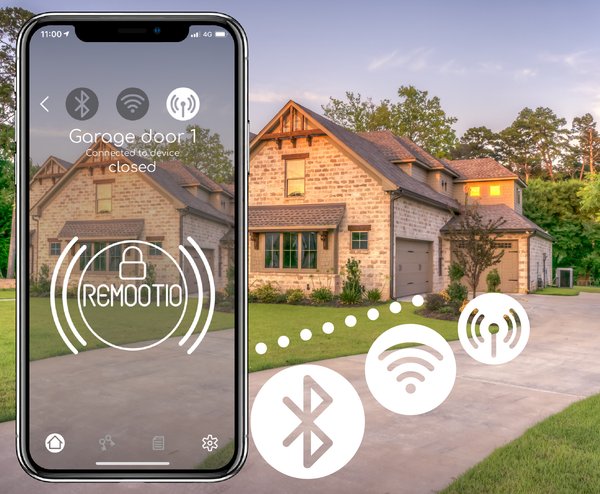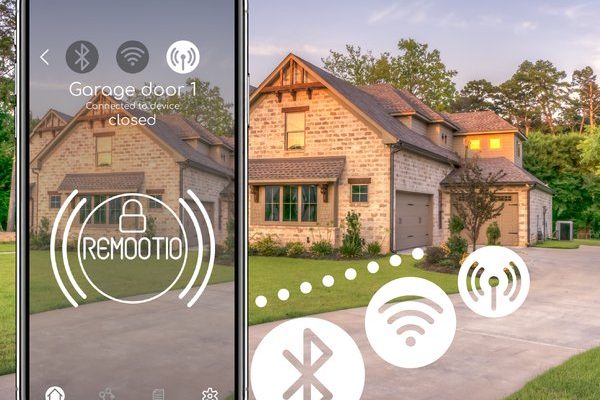
Imagine you’re at a coffee shop, chatting about this with a friend. You want your garage door to respond quickly, no matter where you are. Wi-Fi could give you long-range control from anywhere, but it might be slower during busy network times. On the other hand, Bluetooth could mean instant control when you’re close by but might not reach further than your driveway. So, how does it all break down? Let’s dive in.
The Basics of Smart Garage Door Openers
Smart garage door openers have transformed how we interact with our garages. Instead of juggling traditional remotes or keys, we can now control our doors with a smartphone app. This tech-savvy approach promotes convenience and security. Most smart openers can be operated through Wi-Fi or Bluetooth, making it essential to understand how each option works.
Wi-Fi openers connect to your home’s internet, allowing you to operate the door from virtually anywhere, as long as you have internet access. Think of it as the ultimate remote control: you can open or close your door from the grocery store or while lounging on the couch.
On the other hand, Bluetooth openers create a direct link between your phone and the opener. This connection is great for quick access when you’re near your garage. However, if you’re hoping to open your garage while you’re halfway home, you might hit a roadblock.
How Do Wi-Fi and Bluetooth Work?
Wi-Fi connections utilize your home’s internet to link devices. This means that your smart garage door opener works off of your home network. To set it up, you’d typically connect the opener to your Wi-Fi through an app on your smartphone. Once set up, you can control it from anywhere—inside or outside your house—as long as you have an internet connection.
Here’s a simple breakdown of Wi-Fi functionality:
- Range: Unlimited within the limits of your Wi-Fi network.
- Control: Access via a mobile app from anywhere.
- Power: Requires a stable internet connection.
On the flip side, Bluetooth connections operate differently. With Bluetooth, your device directly communicates with the garage door opener. This usually requires you to be within a certain range—often around 30 feet. This makes it less ideal for those who want to control their opener from a distance.
Here’s how Bluetooth works in your opener:
- Range: Limited to a short distance (within about 30 feet).
- Control: You need to be close to operate.
- Power: Doesn’t rely on the internet.
Accessibility and User Experience
The usability of your garage door opener can depend heavily on how you plan to interact with it. If you want to open and close your garage door when you’re away from home, Wi-Fi is the clear winner. Any time you can use your smartphone with an app, you’re in control, whether you’re coming home from work or waiting at the curb for a delivery.
However, Bluetooth shines when it comes to ease of use right at the doorstep. Pairing your phone with the opener means it can usually open with a quick tap, assuming you’re within the range. Just imagine pulling into your driveway, and your garage door swings open without a second thought. Perfect!
Still, it’s crucial to consider potential access challenges. Wi-Fi connections could fail during an outage, while Bluetooth might not be so helpful if you forget your phone inside. It’s all about what works best for your lifestyle.
Reliability: Factors to Consider
When we talk about reliability, several factors come into play: signal strength, connectivity issues, battery life, and interference.
1. Signal Strength: Wi-Fi can experience hiccups or even drop connections, especially during heavy usage times. If five family devices are streaming at once, your garage door opener might lag.
2. Blue-tooth Interference: Bluetooth is also vulnerable, especially if you’re surrounded by several other wireless devices. However, it does connect quickly when you’re nearby, making it more straightforward for immediate access.
3. Battery Life and Maintenance: Some Wi-Fi openers require regular software updates that may interrupt functionality. In contrast, Bluetooth openers usually rely on batteries. Keeping batteries fresh may help maintain a reliable connection.
To give you a clearer picture, here’s a quick comparison:
| Feature | Wi-Fi | Bluetooth |
|---|---|---|
| Range | Unlimited (with internet) | Limited (approx 30 feet) |
| Control Remotely | Yes | No |
| Connectivity Issues | Can lag during busy times | May drop in crowded spaces |
| Maintenance | Software updates | Battery replacement |
Security Considerations
Security is an essential aspect of any smart system, especially with garage door openers.
Wi-Fi technology, while convenient, does have some vulnerability risks. It can get hacked if the network isn’t secured properly. Having a secure password and up-to-date firmware can help, but you’ll still want to keep an eye on your connectivity logs to ward off any strange activity.
Bluetooth, on the other hand, is generally secure for local transmissions. Its limited range makes it less susceptible to interception. But it still has its risks, especially if someone is nearby and can try to connect without your permission. Strong pairing security and ensuring only your devices are linked can help mitigate this.
Cost and Setup
Next up is cost. Smart garage door openers can vary widely in price, but both Wi-Fi and Bluetooth options offer budget-friendly choices to premium models.
Setup can also differ significantly. Wi-Fi set-ups often involve connecting to your home network and potentially going through some troubleshooting. Many brands have user-friendly apps to guide you through it, but some have more complex requirements. Bluetooth setups are generally straightforward: if your device is nearby, it should connect quickly.
Consider breaking the process down:
- Wi-Fi: Requires internet connection and may involve additional steps for pairing.
- Bluetooth: Pairs easily when you’re close, often just requiring app installation.
Popular Brands: Wi-Fi vs. Bluetooth Options
Several popular brands offer Wi-Fi and Bluetooth smart garage door openers. Here’s a quick look:
Wi-Fi Options:
– Chamberlain: Known for its reliability and extensive range.
– LiftMaster: Offers seamless integration with smart home systems.
Bluetooth Options:
– Genie: Simple, straightforward operation with ease of use.
– Nexx: Solid Bluetooth connection with accessible features.
Each of these brands brings something unique to the table, making it essential to research what best fits your needs and preferences.
Real-World Scenarios: When to Choose Wi-Fi or Bluetooth
Putting this all in perspective can help you decide. Imagine it’s a rainy day, and you’re stuck in traffic. If you have a Wi-Fi garage door opener, you can open the door from your phone, allowing you to pull right in without getting wet.
Now think about a scenario where you’re pulling up to your house with your hands full—perhaps carrying groceries. If your Bluetooth opener pairs smoothly when you’re near, you can get inside without fumbling for keys or your phone. Honestly, that convenience can be a game-changer.
Assessing your specific needs often sheds light on which technology you should go for. Here’s the thing: if you frequently find yourself away from home but want to keep everything secure and controllable, opt for Wi-Fi. On the other hand, if you primarily want to control the door quickly at close range, Bluetooth could be your best bet.
Deciding between Wi-Fi and Bluetooth for your smart garage door opener ultimately comes down to how you’ll use it. If you want long-range control, ease of use from anywhere, and connection with various smart home devices, Wi-Fi is the way to go. But, if you prioritize fast access right at your doorstep and value simplicity, a Bluetooth opener might just be ideal.
Both options have their unique advantages and potential challenges. With this guide in hand, now you can make an informed decision that fits your lifestyle, ensuring smooth operations and peace of mind every time you come and go.
